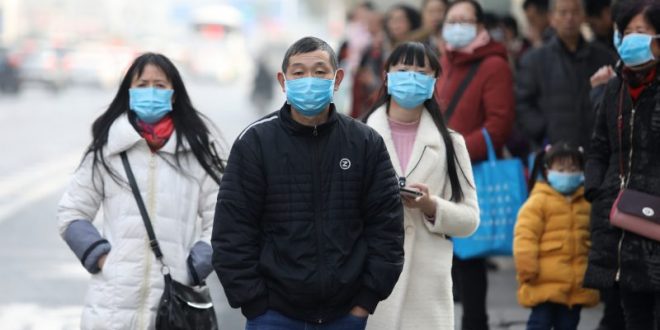China will do its utmost to strengthen cooperation with the World Health Organization and offer assistance to meet the urgent needs of countries severely hit by the novel coronavirus pneumonia epidemic, a senior official of the Foreign Ministry said recently.
Given the trend of the epidemic’s global spread, China has, within its ability, provided test kits to some countries, including Pakistan and Japan, and shared therapeutic solutions with many others, Vice-Foreign Minister Ma Zhaoxu said at a news briefing in Beijing.
Ma said that the Chinese government will soon provide urgently needed medical materials to South Korea as the number of confirmed cases continues to rise in the country, which has the most infections outside of China.
The two countries are also looking into establishing a joint quarantine procedure to effectively prevent cross-border transmission, he said.
As of Thursday, more than 13,000 coronavirus cases have been reported outside of China, with South Korea, Italy, Iran and Japan being the worst-hit countries.
According to Ma, the requests for assistance that China has received from other countries are for virus test kits, protective materials such as masks, drugs and treatment experience.
“In fact, many of these countries have provided donations to China for combating the virus,” Ma said.
As of Monday, 62 countries and seven international organizations had donated medical materials such as masks and protective clothing that China urgently needs.
Speaking at the news briefing, Zeng Yixin, deputy director of the National Health Commission, said that China will also boost technical cooperation and communications with the international community.
“China will continue to support exchanges between Chinese and foreign experts on sharing preventive and treatment techniques through various forms such as videoconferences and teleconferences,” Zeng said.
China will also support domestic public health and medical institutions to send expert teams to carry out cooperation with institutions in relevant countries and help them train medical professionals, he said.
Ma, the vice-foreign minister, said the epidemic has once again made it clear that nations have shared interests in the age of globalization.
“Faced with the epidemic, all countries should help each other as passengers in the same boat, strengthen cooperation and jointly build a community with a shared future for mankind,” he said.
He added that China hopes the World Health Organization will further promote international cooperation, especially by offering more help and assistance to developing countries with weak protective capability.
“China will not be absent from such efforts,” Ma said, adding that the country is considering donating money to the WHO in response to its appeal to help efforts to fight the virus.
Diplomat cites shared future amid outbreak
China will go all out to work with relevant parties and share with the international community its experience in containing the novel coronavirus pneumonia outbreak, as it strives to build “a community with a shared future for mankind”, officials said.
In a speech on Monday at the Royal Institute of International Affairs in London, Chinese Ambassador to the United Kingdom Liu Xiaoming said: “We have been open, transparent and responsible in tackling the virus because we believe in a community with a shared future for mankind.”
Liu said that since the outbreak of the coronavirus, China has engaged in global cooperation and shared information in a timely manner with the world, including sharing the genetic sequence of the virus and enhancing cooperation on vaccine development.
The Chinese people have stood united and taken the most comprehensive, strict and thorough measures of disease prevention and control, Liu said. “The whole nation has been mobilized, and we are waging a ‘people’s war’ against the virus,” he added.
“The virus knows no borders. It is a common challenge facing all mankind. To safeguard global public health, countries must join hands and stand shoulder to shoulder,” Liu said, adding that “the ongoing battle against COVID-19 is living proof of how much we belong to this community with a shared future for mankind and how urgently we all need to come together to build it.”
The epidemic is spreading across the world. On Monday morning, the World Health Organization received reports of a total of 8,739 cases outside China from 61 countries, with 127 deaths. In the 24 hours before the WHO news conference in Geneva at 4 pm on Monday, there were almost nine times more cases reported outside China than inside China.
WHO Director-General Tedros Adhanom Ghebreyesus said on Monday that containment is still the best measure for countries to fight against the epidemic, and considered the situations in South Korea, Italy, Iran and Japan as of “greatest concern”.
As of Tuesday, South Korea has reported 5,186 cases of infection and 34 deaths, and Iran had reported 2,336 cases, including 77 deaths.
A WHO team arrived in Iran on Monday to deliver supplies and support the government in its COVID-19 response.
Tedros emphasized that the virus is not influenza. “We are in uncharted territory,” he said, adding that with early, aggressive measures, countries can stop transmission and save lives.
“Our message to all countries is: This is not a one-way street. We can push this coronavirus back. Your actions now will determine the course of the COVID-19 outbreak in your country,” he said.
Michael Ryan, executive director of the WHO’s Health Emergencies Program, praised China for also sending a technical response team to help Iran. He also appreciated that China has committed to helping countries with weak public health systems.
Foreign Ministry spokesman Zhao Lijian said in Beijing on Tuesday that since the epidemic is spreading to more countries, global cooperation in public health security is more important and urgent.
“While maintaining epidemic prevention and control domestically, China will continue to work together with relevant parties and offer as much support as it can to overseas countries,” he said.
Zhao said that China has already provided coronavirus test kits to Pakistan, Japan and the African Union, shared its diagnosis and treatment plans with many countries, and sent medical experts to Iran.
He also appreciated the global support for China’s fight against the coronavirus. As of Monday, China had received donated materials from 46 countries and six global organizations.
Ambassador Zhang Jun, China’s permanent representative to the United Nations, said on Monday at the UN headquarters in New York that China’s fight against the outbreak has made good progress, the number of new cases in China is declining and medical research has achieved encouraging initial results.
“COVID-19 is a common challenge facing all of humanity. China is fighting not just for itself, but also for the world,” he said.
Zhang added that China, which will preside over the United Nations Security Council in March, will make efforts to strengthen solidarity and cooperation with all parties to ensure that the council fulfills its responsibility and plays a constructive role in maintaining international peace and security.
Zhang said that China will give priority to strengthening multilateralism and upholding international cooperation.
He said that unilateralism is currently having a strong impact on the international order, the rule of law and the status of the UN. At the time of the 75th anniversary of the organization, the world needs multilateralism, a stronger UN and Security Council, and solidarity among member states.
He added that China will also make its efforts in promoting
regional political settlements and maintaining international fairness and
justice. The council will play its usual role this month in discussing hot
spots such as Syria, Libya, Palestine, South Sudan and Yemen.
Risks of reverse current virus spread highlight importance of coordination
There has been a continuous decline in the number of new novel coronavirus infections each day in China, including in Hubei province, the area most affected by the outbreak, and more and more provincial-level regions have not seen new cases for days.
But the public’s anxiety has still not eased as the number of people infected by the virus has been increasing exponentially in some countries and people fear that new arrivals may bring the virus with them. The combined daily increase outside China is already about seven times that inside it — 1,054 to 144 on Wednesday.
According to China’s customs administration, among the people arriving to enter the country since the start of the outbreak, 75 were found to be infected with the novel coronavirus, 779 were suspected of being infected, and 6,728 showed symptoms of infection as of Tuesday, most of which have been detected recently — 227 arrivals showing symptoms and 63 suspected cases were reported on that day alone.
That explains why President Xi Jinping, who is directing the country’s efforts to curb the epidemic, highlighted on Wednesday the risks accompanying the rebooting of the economy, which was powered down with an extended Spring Festival holiday to restrict transmission of the virus. He called for no relaxation in the epidemic response preparedness as people move around the country and start to gather again.
Meanwhile, his urging that more attention be paid to epidemic prevention and control work in Beijing and other key regions, should prompt the country to not only maintain the pressure of its resistance against the spread of the virus from within, but also strengthen its inspection, quarantine and screening efforts at customs to avoid a “reverse current” from outside that would render all the country’s internal counter-epidemic efforts in vain.
Thus, it is strongly suggested that the country should consider expanding its 14-day quarantine requirements from those having recent traveling experience in the four worst hit countries — the Republic of Korea, Japan, Iran and Italy — to all visitors coming from outside, including Chinese nationals.
That some countries, such as the United States, have stopped disclosing the number of citizens that have tested positive for the novel coronavirus from Monday, which has left countries in the dark about their situations, makes this essential.
As such, although the country remains open to those from outside, a no-one-should-be-omitted 14-day quarantine should be imposed on all those wanting to enter the country. While this will drive up the administrative costs given the still sizable population flow into the country each day, it should be adopted immediately to plug the obvious loopholes to help the country to defend itself against the virus and thwart the cross-border spread of the virus.
And although there is no one-size-fits-all approach to contain the epidemic, it is high time countries strengthened cooperation and coordination, and expanded surveillance to find, isolate and care for every case and to trace every contact. Defeating the virus requires countries take an all-of-government and all-of-society approach to keep the virus at bay.
Chinese companies producing virus testing kits for use in other countries
China’s genomics sequencing company BGI has received international recognition and vast orders of its detection kits for the novel coronavirus, injecting strength into the global fight against the epidemic.
BGI announced on Monday that its detection kit has been awarded a CE-IVD designation-a certification for all in vitro diagnostic devices sold in Europe-giving it the stamp of regulatory approval.
Yin Ye, executive officer of the company, which is based in Shenzhen, Guangdong province, stated on Tuesday that international orders of the detection kit have exceeded 310,000 units from more than 26 countries and regions.
“Some countries, such as Japan and Brunei, have received our product, and we are in contact with another 25 nations for more orders,” he added.
BGI’s test solution, approved by the National Medical Products Administration of China in January, is widely used in the country, providing a scientific basis for diagnoses of confirmed cases and discharges of recovered patients.
The life science firm has accomplished 360,000 detections of the coronavirus and established the “Huo-Yan laboratory” to accelerate testing abilities. Its first lab was built in five days in Wuhan, the epicenter of the novel coronavirus outbreak, and quickly spread to a dozen cities including Beijing, Shenzhen and Changsha in Hunan province.
The lab in Wuhan is capable of handling 20,000 samples a day and has tested more than 110,000 samples so far, while the two in Shenzhen had handled more than 237,000 samples by Tuesday.
Furthermore, the firm is also promoting the establishment of Huo-Yan labs abroad, with one in United Arab Emirates under construction.
Yin emphasized that some countries need a package of solutions rather than just test kits.
Sufficient supply of high-quality test kits is crucial to guarantee testing for the nucleic acid of the virus. So far, the firm has produced about 1.3 million testing kits and has a maximum production capacity of 300,000 units daily.
“China’s growing power of medical equipment research and manufacturing in the last 10 years has laid a solid foundation to deal with that boom in sudden demand,” Yin said.
To meet the urgent need for testing kits, Chinese authorities have issued approvals for 10 products that employ the nucleic acid method to test for the presence of the infection.
In addition, BGI announced on Tuesday that it is collaborating with Intel and Lenovo to accelerate the analysis of the genomic characteristics of the coronavirus.
Guangdong’s health commission, which authorized BGI as one of its testing service providers, claimed the firm’s product assisted them in examining suspected cases for early diagnosis and eased the testing pressure for primary medical and health institutions.
Besides BGI, Guangzhou-based DAAN Gene is another company that has developed the nationally approved kits. Its production capacity is 300,000 to 500,000 daily.
DAAN announced on Tuesday that its testing kits have also earned the CE-IVD designation, but it has yet to begin sales in overseas markets.
Shenzhen New Industries Biomedical Engineering Co also declared its anti-COVID-19 detection kit has been granted the CE-IVD designation and acquired its first order of 20,000 units from Italy.
This is not the time to play the blame game
China has been making its utmost efforts to fight the COVID-19 outbreak, and the strict measures it has taken to rein in the epidemic are gradually yielding results, except perhaps in Hubei province.
But since an epidemic is a common threat to humankind as a whole, the international community should help China tide over the difficulties by sharing their experiences and advanced methods to prevent and control the epidemic, because by so doing they would be helping the entire humankind.
But many Western politicians and media outlets have spared no efforts to vilify China’s political system, especially the leadership of the Communist Party of China at a time when China has been using all the resources at its disposal to fight the epidemic. For instance, US Senator Marco Rubio, over the weekend, once again claimed China has failed to “share necessary information” that could have contained the spread of the novel coronavirus and blamed it for putting the world at risk as more countries reported their first deaths from the virus.
Indeed, the local authorities in Wuhan, Hubei province, didn’t handle the epidemic properly in the initial days of the outbreak. But later, the central authorities mobilized resources nationwide to fight the disease and closely coordinated with the World Health Organization to take measures to control the disease.
China did share its experience with the rest of the world as it imposed strict quarantine measures on the epicenter of the outbreak in Hubei province. Strict and effective quarantine and lock-down measures in certain places are a scientific way of preventing cross-infection and containing the spread of the epidemic. However, some Western media outlets see the Chinese government’s community quarantine measures as a manifestation of “high-handed” rule.
Such distorted, malicious reports are an apt example of irresponsible behavior. Such reports and comments from Western politicians and media outlets have not only hurt the feelings of Chinese people, but also misled the international community, which undermine international cooperation and solidarity in the face of a global medical emergency.
It is true that China’s political, economic, social and cultural systems are different from those of many other countries, but they are the choice of the Chinese people, and the inevitable outcome of China’s historical development that suits its national conditions. The prevention and control of the epidemic is not only medical and health problem but also a comprehensive crisis management problem. In this unprecedented war against the novel coronavirus, the Chinese system has fully displayed its advantages in terms of decision-making, mobilization and execution abilities, and its ability to correct mistakes.
The Chinese government mobilized the social mechanism within a very short time despite the COVID-19 outbreak affecting Wuhan, a densely populated city, during the Spring Festival travel rush season. From locking down the epicenter, sending medical aid teams and completing emergency construction of medical facilities to organizing the supply of emergency medical products and coordinating efforts to prevent and control the epidemic are all a reflection of China’s institutional advantages.
The authorities have taken prompt measures to correct the mistakes of some officials who didn’t perform their duties properly in the initial stages in some regions, punished relevant personnel according to Party disciplines and the law, and have thus ensured that the measures to control the spread of the novel coronavirus are implemented strictly and effectively.
The novel coronavirus, as the name indicates, is a new type of virus, which is still to be properly understood by the scientific community. Yet, despite being hit by the epidemic, China has been resilient enough to try to bring production back to normal. More important, people in Hubei province have been making great sacrifices to enable the nation to win the battle against the epidemic.
As such, this is not the time for people to play the blame game. Instead, members of the international community should coordinate their efforts to contain the rising cases outside China. As for China, it too has the responsibility and obligation to promote international cooperation in preventing and controlling epidemics and conducting scientific research to find cures for viruses.
The author is a researcher at the Institute of European Studies, Chinese Academy of Social Sciences.
 Afghanistan Times
Afghanistan Times




